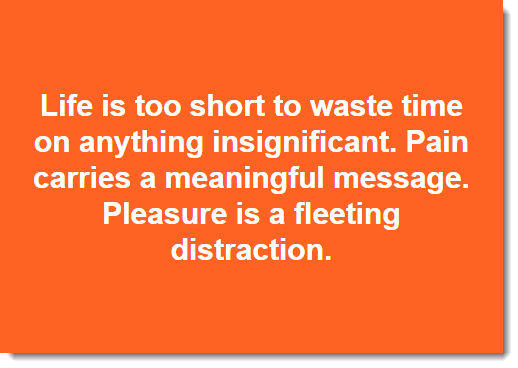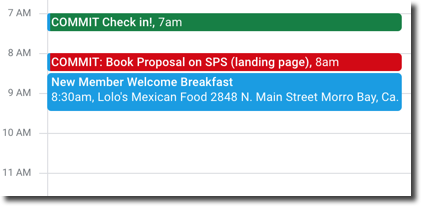Commit
Commitment is essential to consciousness. Clear commitment is important. You can determine your commitments by observing the results you are producing. Everyone is fully committed, evidenced by their outcomes. This concept can be both challenging and freeing. It is challenging because it makes us face our current results, but it is freeing because it allows us to clarify and change our commitments. This provides an opportunity for empowerment.
"If you commit to nothing, you'll be distracted by everything." ~ Noah Kagan
Commitment gives you peace of mind, integrity and social bonds, expertise and power, love, and happiness. If you have ever felt confused, distracted, or unable to finish tasks, you might be struggling with a lack of commitment. Rather than seeking the best option in life, you should choose one and commit to it:
- Irreversible decisions: When a decision is irreversible, you are more likely to appreciate the good in it.
- Focus: When you commit to one outcome, you can focus your attention and energy without being diluted by other options.
- Community: Committing to one place allows you to integrate into a community, build strong relationships, and benefit from increased trust and support.
- Character: Your repeated actions form your character. By committing to your habits and making them rituals, you develop consistency and integrity.
- Expertise: Committing to one career path allows you to develop your expertise and reputation without being sidetracked.
- Love: Marriage, as a form of commitment, provides the security to work through challenges and allows love to endure.
Commitment
Commitment is defined as 'the state of being bound emotionally or intellectually to a course of action.' When must decide to take action or we fail to act - the outcome is enivitable to produce a specific result
Show Up. Stand Up. Step Up.
You show up when you make a commitment.
You stand up when you refuse to let yourself (and your excuses) stand in your way from taking the first step.
You step up when you level up and become the person who overcomes the obstacles that would otherwise stop you.
What am I committed to today? Whats the one thing that matters more than anything else? What is most significant? What you commit to TODAY is where will make an impact.
Overcommitting doesn't help. If you don't commit to one thing, you can't commit to anything.
When others ask for help, weigh the impact on existing commitments. It's unfair to commit to taking on more than you can handle. But you can handle more when you truly commit yourself and allocate the time and space necessary.
This is key since integrity is one of your core values.
What if making a commitment was as easy as hitting the save button?
AuthorDock: Punchlists, milestones, and events... I'm adding a label called 'Commit' and once selected, you can add a date and resource.
- Considering - Someday/Maybe - A could do.
- Planning - pre-committed - A should do.
- Committed - The promise! Turns RED. - A must do.
- WIP (Work Order)
- Complete (Removes form active list of milestones)
- Cancelled (Removes form active list of milestones)
Levels of commitment
Step 1 is to prioritize your commitments. They are not all weighted equally. A simple way to determine the level of action we take is to use the Must, Should, Could spectrum.
In the next 24 hours, what must you do? What can should you do (but can wait)? What could you do (once you complete your musts)?
Sidebar: When you let your could's & should's take priority over your must's, you likley feel time constrained. When you discern your true must's - you make time work for you, you must let them take precedence.
- Must Do
- Should Do
- Could Do
What outcome are you committed to? By when? No deadline = no sense of urgency. We do what we commit to. If you value integrity as highly as I do, you will stick with your commits until they are complete. Few things are as unnerving to me as unmet commitments.
Can'ts
At what point to could's, should's, or must do's become can't's?
When we hit an obstacle...
Do we let our could's become cant's? Often we do.
Do we let our should's become can'ts? We might.
Do we let our must's become can'ts? Never.
Or when our time expires...?
Overcoming obstacles
Commitment is about overcome obstacles.
What triggers commitment?
There is an endless list of things we could do. And plenty more we should do. But the list of things we must do is what matters. What's significant is what matters.
Who initiates a commitment?
I recently stumbled on the book Commit by Linda Formichelli. It provides many different strategies to amp up your level of commitment through specific actions you are actually willing to take. Easing your way out of a problem doesn't always work, sometimes you have to take a bold (possibly painful) leap of faith.
Failure and pain
Much of the fear of failure stems from our adversity to pain. Jeff Goins exposes a key distinction in The Art of Work that the key isn't to focus on happiness itself, but rather finding a reason to be happy in the first place. It's the why that gives meaning, and meaning is the prime driver of action. When we know why we are doing something, it's easier to do what matters.
But what really resonated with me after reading his books was this:

When the fear of not trying something is stronger than the fear of failing at it, you'll find the motivation to act.
What are you committed to?
I made a list of what I'm committed to, this way, when I question whether or not I should be doing something I'm doing, I just check the list. If it's own it, I can do it without feeling guilty that I should be doing something else.
- Meditation
- Teaching (Ukulele, Publishing, Meditation, Yoga, etc.)
- Learning Tennessee Waltz on the Uke
- Client work (meeting client expectations)
- Healthy Living
- Yoga
- Kindness (inclusion, not exclusion)
- Creation
- Improved Processes / Streamlined Workflows (AuthorDock)
- Marriage (partnership)
- Writing
- An outcome / creating meaningful moments
- RIGs
- Acts of significance
- Helping others
- Living up to my potential
- Positively impacting the maximum number of people
- Leading (establishing meaningful objectives for myself & others)
- The 150 Solution
- Assisting others (where my skills add value)
What are you committed to?
Bold Commitments
http://1000awesomethings.com/the-top-1000 https://jenniferdewalt.com https://50interviews.com
Commit to one thing each day
All I need to do is commit one full hour to an important project, and I will feel much better. If I commit one full-day to each project (or client), imagine how much I'd get done in 30 days!
What one idea, followed through, could be a game changer?
Putting this into action, I add an appointment to my calendar each day labeled COMMIT: [ACTION] and block out the time (a minimum of 30 minutes).

Begin with small commits
To begin strengthen your commit muscle, start with small commits. The main criteria being that it's what you start that matters rather than what you finish. Additionally, it needs to be something that is 100% within your power. Here's the criteria I use:
- Within my control
- Benefits myself or others
- Aligned with my mission
Examples:
- Take a cold shower
- Write a thank you card
- schedule an appointment
- Spend 30 mins on a video tutorial for ____.
- Spend 30 mins contacting as many former clients as possible (Better: Draft a email template to blast to 25 former clients/day).
End with small rewards
It's important you take a break and do something you enjoy after you've completed your commit for the day. Positive reinforcement will cause you to get fired up for your next commit!
- 10 mins of ukulele
- 20 min meditation
- 15 min walk
- Transfer $10 to your 'FU Money' account
Find what brings you joy and do that.
The work will teach you how
This is vital! Doing the work will teach you what you need to know and where you need to adjust to stick to your commits. It's great to have a system, but it's better to implement what you know and test your ideas out.
Write it down and stick to it - no excuses!
Insert graphics:
- Sugar is poison
- MKP anchor
- Pubwriter = Peace
Interest vs. Commitment
Chapter 9 in The 12 Week Year focuses on the difference between interest and commitment.** Many people express interest in achieving their goals, but fail to make the commitments necessary to overcome obstacles and achieve results. The authors offer a new definition of commitment as "a conscious choice to act in order to create a desired result". They go on to state that interest is conditional, while commitment is unconditional. When you are interested in something, you engage with it only when it's convenient. When you are committed, on the other hand, you see it through regardless of the circumstances.
The authors go on to highlight four keys to making and keeping successful commitments:
- Strong desire: You must genuinely want the goal you are committing to, as this desire will fuel you to overcome challenges.
- Keystone actions: Identify the most impactful actions that will drive your progress toward your goal. If you have a goal to lose weight, for example, committing to a daily workout as a keystone action would have a greater impact than a less frequent action, such as buying a new scale.
- Count the costs: Acknowledge the sacrifices you will need to make to achieve your commitment, such as time, money, and effort. If you are aware of the costs upfront, you will be more likely to persist when challenges arise.
- Act on commitments, not feelings: Your feelings will fluctuate, but your commitments must remain steadfast. When you feel discouraged, revisit your "why" and take action based on your commitment, not your mood.
The opposite of commitment is negligence.
Commit to experience fully - both the good and bad. There is no failure, only lessons and experiences. Setbacks build wisdom. Obstacles are opportunities to grow.